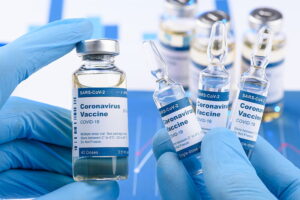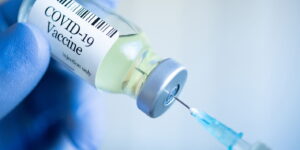Tag: vaccines
Attempting to Get Vaccines and Stimulus Checks for All: Biden Administration Plans on Rapid COVID Relief
by The Cowl Editor on March 18, 2021
National and Global News

by Sydney Olinger ’23
News Staff
March 11 marks the one-year anniversary of the nationwide shutdown that was enacted due to the rapid spread of COVID-19. A year ago today, no one could have predicted that our country would still have increasing cases and harsh COVID-19 regulations. In his first prime-time address to American citizens, given on this one-year anniversary, President Joseph Biden announced that he will direct states to make all adults vaccine-eligible by May 1.
This directive will hopefully mark the start of our country’s return to normalcy, but Biden noted that not all adults will be vaccinated by May 1. Therefore, some COVID-19 regulations, such as mask-wearing and not gathering in large crowds, need to be maintained.
The federal government is in control of distributing the vaccine to each state, but states are given discretion in deciding who is eligible. Most states have been consistent in deciding who receives priority for the vaccine, but some have different guidelines for which groups are eligible first. According to Biden, all adults should be able to get in line for their first dose of the vaccine by May 1, as long as the country has enough doses and rollout goes successfully.
On the same day as this prime-time address, Biden signed a $1.9 trillion COVID-19 relief package into law. The intent of this bill is ultimately to help Americans who are struggling financially. The bill also aims to stimulate an American economy that has been facing major challenges for the last year, as countless businesses have shut down or reduced capacity in order to limit the spread of the virus.
Biden’s plans for returning the country to some semblance of normalcy offered a sense of hope to many people and businesses in the country. With the increased distribution of vaccines to all adults willing to get the vaccine, Biden hopes that we will be able to have as close to a normal Fourth of July that we possibly can. “By July the Fourth, there’s a good chance you, your families and friends, will be able to get together in your backyard or in your neighborhood and have a cookout or a barbecue and celebrate Independence Day,” said Biden.
Despite the fact that Biden hopes we will be able to enjoy a fairly normal holiday, he is still encouraging people to not gather in large crowds. As vaccine rollouts progress in the coming weeks, the CDC will also update guidelines regarding travel, work, and gatherings. Depending on the number of cases as well as deaths, the first holiday we should be able to celebrate fully with people outside of immediate households will be Independence Day. “After this long hard year. . . [we] will make this Independence Day something truly special where we not only mark our independence as a nation but begin to mark our independence from this virus,” stated Biden. Though we should remain hopeful that we will return to a sense of normalcy soon, we must also continue to follow the safety guidelines set by the CDC.
Biden also asked Americans to do their part to help the country make it to the other side of the pandemic. “A lot can happen,” Biden said. “Conditions can change. The scientists have made clear that things may get worse again. As new variants of the virus spread, we’ve got work to do to ensure that everyone has confidence in the safety and effectiveness of all three vaccines.” Throughout his speech, Biden expressed empathy and compassion for the lives lost during the pandemic both within our country and across the world, while also offering hope to the nation that we will overcome the virus and all of the pain it has brought.
Helping to Turn the Tide: First COVID-19 Vaccinations Flood Ocean State
by The Cowl Editor on February 4, 2021
Campus

by Eileen Cooney ’23
News Staff
On Feb. 1, Rhode Island reported a 2.7 percent COVID-19 positivity rate, its lowest since October, with 158 new cases and 13 fatalities. The decrease in the positivity rate is due to a combination of factors, but many health officials are pointing to the nearly 77,000 first doses of the vaccine that have been administered so far, and the 28,000 people in Rhode Island who have been fully vaccinated.
Rhode Island, like all states currently, is seeking to ramp up its vaccination efforts in hopes of stemming the winter surge and combatting new variants of the virus that are causing alarm.
On Jan. 28, state health officials announced the next phases of the state’s vaccination plan, which allows those who are 65 and older to be vaccinated starting in mid-February. As of now, there are only limited vaccinations available for those above the age of 75. Rhode Island first made vaccinations available to health-care workers, first responders, and nursing home and assisted living facility residents and staff.
Dr. Nicole Alexander-Scott, Rhode Island’s Department of Health director, has said that the next upcoming phase will involve all Rhode Islanders over the age of 16 who have underlying health conditions, are immunocompromised, or are pregnant. This next phase is also unique in that it would involve distributing vaccines at a quicker pace in those towns where there are a disproportionate number of hospitalizations due to the virus, Alexander-Scott has said in press conferences.
She states that, currently, the state is dealing with a limited supply of the vaccine, but that “the aims of this next phase are to protect those most at risk for hospitalizations and death from COVID-19.”
In neighboring states like Massachusetts, the vaccine roll-out has not been as well-received by residents. Massachusetts Senator Eric Lesser said on Jan. 28 that “the Phase 2 vaccine rollout is creating mass confusion and anxiety for our eligible senior population. The system is cumbersome, contradictory, and asks residents over 75 to navigate a haze of web links, locations, and instructions, each with different criteria and scheduling systems.” In response to criticism, Massachusetts Governor Charlie Baker urged all to be patient with the process until a steadier, more stable supply of doses is obtained from the federal government. The governor also said that his administration was working to create more resources to help those who are older and having difficulty trying to navigate the sign-up process.
News of increased vaccinations offers Rhode Islanders and those in neighboring states slight glimmers of hope during what has been a disastrous winter for the state and the country as a whole. New coronavirus variants that were first identified in South Africa and the United Kingdom have been found to be more contagious, and now there is preliminary evidence suggesting they could even increase mortality. On Jan. 29, Johnson & Johnson released data revealing that their one-dose vaccine is 66 percent effective against moderate and severe disease, but this hopeful measure was overshadowed by other data, suggesting the vaccine could be less effective against these new variants. Shares of Johnson & Johnson fell on Friday as investors were hoping for an efficacy number above 80 percent. In response to this pessimism among some, John Brooks, a chief medical officer at the CDC, said that “any vaccine is better than no vaccine.”
In the meantime, Providence College students find themselves going through the motions of weekly testing and social distancing measures following their return to campus for the spring semester. After observing an initial “quiet period” in which students were required to stay in their on or off-campus housing locations, with exceptions given for traveling to class and work, shopping for groceries and receiving grab-and-go meals from Raymond Dining Hall, and participating in outdoor exercise with a student’s own pod, the hope amongst many students is that recent developments on the vaccine front will help alleviate stress and restrictions on the PC community. Time will tell just how successful these recent vaccination efforts have been.
